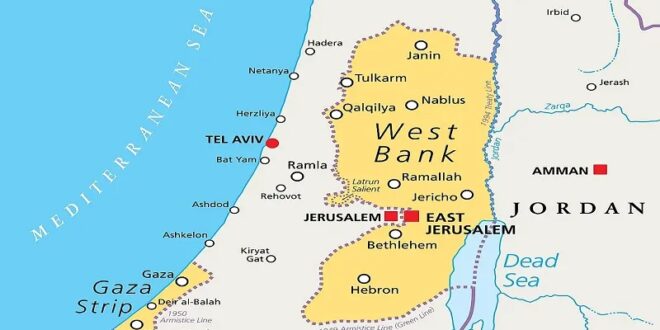If Russia supported the Resistance’s vision for Palestine, then it would undermine its support for its co-ethnics in former Soviet Republics and amount to ethnically cleansing its own people from the Levant.
The Palestinian Question is one of the most emotive issues in modern history due to its anti-colonial and religious dimensions, the latter of which are unique due to Jerusalem’s significance to the three Abrahamic religious, especially Judaism and Islam. UNSC Resolutions have called for the creation of an independent Palestinian State within its pre-1967 boundaries. Israel refuses to implement them due to its maximalist objectives, which are the polar opposite of its Resistance Axis enemies’.
Both want to control everything “from the river to the sea”, which is why Israel refuses to recognize an independent Palestinian State while the Resistance refuses to recognize what it calls the Zionist entity. Russia disagrees with both since it backs a two-state solution, but its disagreement with the Resistance is much more fundamental than with Israel. That’s because what the Resistance is calling for vis-à-vis Israeli Jews is similar to what some former Soviet Republics have called for vis-à-vis ethnic Russians.
The European-descended Jews who dominate Israeli political life are considered by the Resistance to be colonists who must return to Europe in order for there to be peace even if they were born in Israel and don’t hold dual citizenship. Those who’ve followed that side’s discourse on this conflict on social media have probably already come across demands for Netanyahu and others to “go back to Poland” for example. This is supposedly a prerequisite for historical justice to be served from their perspective.
Ethnic Russians living in former Soviet Republics like the Baltic States, Kazakhstan, and Ukraine have also been told to “go back to Russia” even if they were born in those now-independent states and don’t hold dual citizenship. Unlike Ukraine, the Baltics and Kazakhstan aren’t historical Russian lands, yet Russia insists that its co-ethnics’ human rights be respected and opposes their resettlement under coercion. This policy is in spite of those three’s narratives about “Russian conquest, occupation, and oppression”.
Some radicals within the North Caucasus, which are within Russia’s current territory but beyond the borders of the former Kievan Rus that’s considered to be its traditional lands, have similar narratives about Russians that mirror the Resistance’s about European-descended Israeli Jews. Both groups are considered to be colonists whose continued stay on those lands – ethnic Russians in the Baltics, Kazakhstan, Ukraine, and the North Caucasus and European-descended Jews in Palestine – is illegitimate.
Beyond comparisons between Russia’s historical expansion into non-traditional lands and Israel’s foundation, which are outside the scope of this analysis to clarify, each group’s present status is similar. This is all the more so when recalling what Putin said about Russian Jews in Israel: “Russians and Israelis have ties of family and friendship. This is a true common family; I can say this without exaggeration. Almost 2 million Russian speakers live in Israel. We consider Israel a Russian-speaking country.”
It’s partially for this reason why “Lavrov Reminded The World That Russia Is Committed To Ensuring Israel’s Security” late last month, the preceding hyperlinked analysis of which enumerates five other background pieces for readers to review if they’d like to learn more about Russian-Israeli relations. If Russia supported the Resistance’s vision for Palestine, then it would undermine its support for its co-ethnics in former Soviet Republics and amount to ethnically cleansing its own people from the Levant.
Recognizing European-descended Israeli Jews – especially those from Russia – as colonizers and endorsing the Resistance’s demands that they return to Europe even if they were never born there and don’t hold dual citizenship would fuel former Soviet Republics’ demands for ethnic Russians to leave too. Most ethnic Russians moved to the Baltics after World War II around the time when most European-descended Jews moved to Israel so this comparison could be exploited to ethnically cleanse them.
Just like the Resistance considers Palestine to be colonized by European-descended Jews, so too do the Baltics consider themselves to have been colonized by Russians, both during the Imperial period and especially after World War II upon their incorporation into the USSR after two decades of independence. The same goes for what some radicals inside Russia’s current territory think about their ethnic groups’ historical relations with ethnic Russians and the latter’s associated states throughout the centuries.
The Baltic States, Israel, and Russia are all UN-recognized states with international legal obligations to protect their minorities’ human rights, but Israel is also under the obligation to recognize the independence of a Palestinian State. Russia has no such obligation to recognize any of the separatist entities that sprung up within its borders after 1991 so the comparison between it and Israel is imperfect in this regard. Nonetheless, Israel proper has no obligation to dissolve itself like the Resistance demands.
Their call to fully decolonize Israel (meaning the self-professed Jewish State within its pre-1967 borders) is similar to some Westerners’ call to “decolonize Russia” by Balkanizing it and then ethnically cleansing Russians from the non-traditional lands (e.g. those beyond the borders of Kievan Rus) that they inhabit. The Kremlin cannot support this scenario under any circumstances due to the latent threat that it poses to the human rights of its co-ethnics in former Soviet Republics as well as its own territorial integrity.
Russia will therefore always fundamentally disagree with the Resistance about the future of Palestine since it’ll never support the “river to the sea” endgame that this movement wants more than anything. An independent Palestinian State within its pre-1967 borders is the only outcome that aligns with international law. Anything more than that is deemed by Russia to be a latent threat to its own interests as explained and will therefore always be politically opposed.
 Eurasia Press & News
Eurasia Press & News




